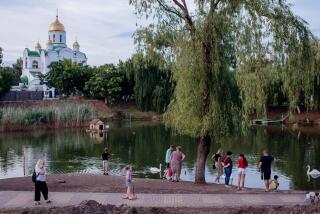Greeks Keep Macedonia a Phantom Nation
- Share via
SKOPJE, Macedonia — President Kiro Gligorov seems genuinely perplexed over how to bring life to his phantom country.
He rules over the only former Yugoslav republic that has gained its independence without provoking a war.
The Macedonian leader has also engineered full withdrawal of the Yugoslav army without either side suffering so much as a scratch.
A grandfatherly former Communist revered by his impoverished people, Gligorov has managed to maintain social tranquillity despite a crippling blockade by Greece and a threat of invasion by bellicose Serbia.
Gligorov has even succeeded in soothing ethnic frictions where his Balkan neighbors have so miserably failed.
But alone among former Yugoslav republics, Macedonia languishes in a diplomatic purgatory. More than half a year after declaring independence, the state remains thoroughly isolated because of a standoff with Greece over its name.
Defenseless in a dangerous neighborhood, Macedonia is an easy target for Balkan adventurism, and many here fear that its vague international status is exposing them to great risk.
“Does this mean that in a peaceful way you cannot become an independent state?” the silver-haired president asked rhetorically, with a disbelieving shake of his head.
Last year, a European Community committee sought to set standards for diplomatic recognition of new countries. It judged Macedonia and Slovenia to be the only two Yugoslav republics fulfilling conditions ranging from control of territory to protection of minority rights. Yet in January, the EC chose to recognize only Slovenia and Croatia. When Serbian rebels embarked on an “ethnic purification” of Bosnia-Herzegovina in early April, the EC belatedly granted recognition to the republic, which has since been overrun.
Under severe pressure from Greece, the EC has changed its tune toward Macedonia. It has ruled that Skopje must satisfy all conditions set by the 12 member countries. Greece is one of those members, and a change in Macedonia’s name is one of its conditions. Greece argues that Macedonia’s name implies territorial ambitions on the northern Greek province of the same name.
The U.S. government has been pushing Greece to drop what one diplomat termed “an irrational issue,” but Secretary of State James A. Baker III made clear to Gligorov during a Washington visit earlier this month that the United States would not move ahead of Europe on the question of recognition.
Macedonian leaders have offered to call their state New Macedonia or North Macedonia but have rejected Greece’s demand that the word Macedonia be dropped completely.
Macedonian politicians have adopted a constitution renouncing all territorial claims on neighboring countries. They have also offered Athens a treaty guaranteeing the current borders.
But Greece has remained obstinate. It continues to block recognition by the EC, which seeks to express European unity by making all decisions unanimous.
From an office replete with carved wooden treasures for which Macedonian craftsmen are renowned, Gligorov insists he is not being stubborn on the subject of what his newly independent nation calls itself. But to change the name, he says, would be “to erase our own identity.”
Macedonia has been the name of the republic since it was founded 48 years ago within the Yugoslav federation as the homeland of Slavs whose ancestors arrived in the 6th Century. The republic comprises the central slice of the vast Macedonian territory now divided among three countries--Bulgaria, Macedonia and Greece.
“To change our name we would have to change everything, from schoolbooks to our poetry to our entire history--everything would have to change,” Gligorov said. “And what benefit would any of this be to Greece?”
The standoff has gutted the Macedonian economy and made the state’s 2 million people virtual prisoners.
Macedonians have no passports acceptable outside their borders. They are crippled by transport blockades imposed by Greece and Serbia and unable to engage in anything but crude barter trade.
There is no legal Macedonian tender, and the Yugoslav dinar has been replaced with brightly colored coupons that government spokeswoman Smezana Osmanlic concedes “are not really money.”
No shop, restaurant or hotel accepts payment by credit card any longer because the international charge card companies have been unable to extend the agreements they had with Yugoslavia to include a state that, officially, doesn’t exist.
A stroll through Skopje’s ancient bazaar, the Carsija, confirms that Macedonians firmly back Gligorov in his defense of their republic’s name.
“We are being strangled by Greece!” said Srecko Grujebski, a metalworks exporter whose business has been paralyzed by the economic blockades imposed by Greece and Serbia. “And what are they doing this for? Because we call ourselves Macedonians, which is what we are. How can we change what we are?”
“In Yugoslavia there is a war raging, and this war can always spread in times of uncertainty,” Gligorov warned.
“If we had international recognition,” the president said, “the last reason would be dropped for anyone to get the notion that our non-recognition and internal difficulties can be used as a pretext for intervention.”
Western diplomats in Belgrade say they, too, are worried about leaving Macedonia so vulnerable.
“There’s the risk of repeating the same situation we have in Bosnia-Herzegovina, where international recognition came too late,” one envoy warned. “They can’t hang out in limbo forever without being sucked into the Yugoslav vortex.”
More to Read
Sign up for Essential California
The most important California stories and recommendations in your inbox every morning.
You may occasionally receive promotional content from the Los Angeles Times.













